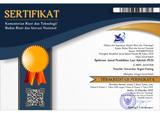The Relationship of Companion's Educational Skills with Learning Participation of KPM PKH Kelurahan Puhun Pintu Kabun Bukittinggi
 ), Jalius Jalius(2),
), Jalius Jalius(2), (1) Universitas Negeri Padang
(2) Universitas Negeri Padang
 Corresponding Author
Corresponding Author
DOI : https://doi.org/10.24036/spektrumpls.v11i3.120269
Full Text:
 Language : en
Language : en
Abstract
This research was motivated by the low participation in PKH KPM learning in participating in learning at family capacity building meetings (P2K2) which was caused by the low educational skills of companions during learning. The aims of this study are: 1) Describe the educational skills of the mentors, 2) Describe the learning participation of KPM PKH, 3) See the relationship between the educational skills of mentors and the learning participation of KPM PKH. This study uses a quantitative correlational approach. The population in this study amounted to 75 people, while a sample of 40 people was drawn using simple random sampling. Techniques in data collection are questionnaires and data collection tools in the form of a list of statements. The data analysis technique uses the percentage and product moment formulas. The results showed that: 1) The description of the educational skills of the companions was categorized as low; 2) The description of PKH KPM learning participation is categorized as low; 3) there is a significant relationship between the educational skills of the facilitators and the learning participation of KPM PKH.
Keywords: Participation, Education, Nonformal.
References
Budiharto, T. (2012). Pendidikan Keterampilan. Surakarta: UNS Press.
Hermanda, S., & Irmawita, I. (2022). Hubungan antara Pengalaman Belajar dengan Partisipasi Belajar di Lembaga Kursus Bahasa Jepang Natsuka Gakkou Kota Padang. Jurnal Family Education, 2(2). https://doi.org/https://doi.org/10.24036/jfe.v2i2.51
Ilham, A. R. B. (2021). Peran Pendamping Sosial dalam Penyaluran Program Keluarga Harapan (PKH) di Kelurahan Parang Layang Kecamatan Bontoala Kota Makassar. Universitas Muhammadiyah Makassar.
Indrawan, I., & Wijoyo, H. (2020). Pendidikan Luar Sekolah. Jawa Tengah: Pena Persada.
Isa, H., & Napu, Y. (2020). Pendidikan Sepanjang Hayat. Gorontalo: Ideas Publishing.
Kementerian Sosial. (2021). Pedoman Pelaksanaan Program Keluarga Harapan Tahun 2021. Kementerian Sosial Republik Indonesia, p. 76.
Normina, N. (2016). Partisipasi Masyarakat dalam Pendidikan. Ittihad Jurnal Kopertais Wilayah XI Kalimantan2016, 14(26). Retrieved from https://core.ac.uk/download/pdf/327228224.pdf
Rahmawati, E., & Kisworo, B. (2017). Peran Pendamping dalam Pemberdayaan Masyarakat Miskin melalui Program Keluarga Harapan. Journal of Nonformal Education and Community Empowerment, 1(2), 161–169. https://doi.org/10.15294/pls.v1i2.16271
Sari, A. K., Aini, W., & Jalius, J. (2018). Hubungan antara Internal Locus of Control dengan Minat Berwirausaha Alumni Pelatihan Bordir di LKP Muslimah Group. KOLOKIUM Jurnal Pendidikan Luar Sekolah, 6(1), 39–53. https://doi.org/10.24036/kolokium-pls.v6i1.5
Sugiyono. (2017). Metode Penelitian Kuantitatif Kualitatif dan R&D. Bandung: Alfabeta.
Suryosubroto, S. (2002). Proses Belajar Mengajar di Sekolah. Jakarta: Rineka Cipta.
Syamsi, I. (2010). Pendidikan Luar Sekolah Sebagai Pemberdaya dalam Masyarakat. Jurnal Pendidikan Luar Sekolah, 14(1).
Taniredja, T. (2013). Model - Model Pembelajaran Inovatif dan Efektif. Bandung: Alfabeta.
Yusuf, M. (2014). Metode Penelitian Kuantitatif, Kualitatif & Penelitian Gabungan (Edisi Pert). Jakarta: KENCANA.
Zulmi, H., & Setiawati, S. (2022). The Relationship Between Interpersonal Ommunication Instructors with Learners’ Participation in the Dance Training Program at LKP Sanggar Permata Hati Padang City. SPEKTRUM: Jurnal Pendidikan Luar Sekolah, 10(2). https://doi.org/10.24036/spektrumpls.v10i2.114946
 Article Metrics
Article Metrics
 Abstract Views : 62 times
Abstract Views : 62 times
 PDF Downloaded : 19 times
PDF Downloaded : 19 times
Refbacks
- There are currently no refbacks.

This work is licensed under a Creative Commons Attribution-NonCommercial 4.0 International License.



